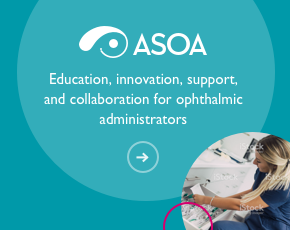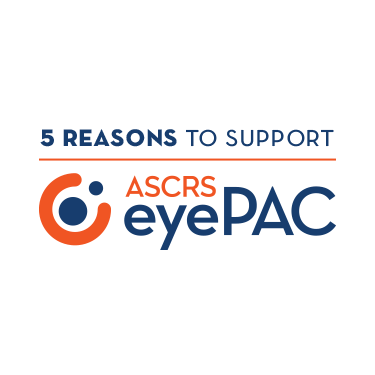ASCRS Joins Medical Specialties in Requesting Additional Relief Through the $100 Billion Public Health and Social Services Emergency Fund
As we have reported, the CARES Act included a $100 billion fund for health care services related to the COVID-19 pandemic. The law states that eligible professionals include those "that provide diagnoses, testing, or care for individuals with possible or actual cases of COVID-19.” We are concerned that the Department of Health and Human Services (HHS) could use this language to restrict the availability of funds for physician practices and ambulatory surgery centers that have had to shut down their practices or dramatically reduce capacity, especially given the high demand for funding from the medical community. We have been told that the intention was to also provide relief to those impacted by the pandemic who are not caring for COVID-19 patients, but the language is not clear.
Therefore, ASCRS joined other similarly affected medical specialties in a letter to HHS asking for assurances that physician practices and ASCs that have been affected by the pandemic, regardless of whether they are caring/testing for COVID-19 patients, be eligible.
Important MIPs Information: CMS to Apply MIPS Extreme and Uncontrollable Circumstances Policy in Response to COVID-19, Reopens Application
In addition to extending the 2019 Merit-based Incentive Payment System (MIPS) data submission deadline to April 30, 2020 at 8 PM ET, the MIPS automatic extreme and uncontrollable circumstances policy will apply to MIPS eligible clinicians who do not submit their MIPS data by the April 30 deadline. If you are a MIPS eligible clinician and do not submit any MIPS data by April 30, 2020, you won’t need to take any additional action to qualify for the automatic extreme and uncontrollable circumstances policy. You will be automatically identified and will receive a neutral payment adjustment for the 2021 MIPS payment year. Read more here.
Payment Protection Program Loans Begin Today
Small Business Administration (SBA) announced that small businesses can apply for the Paycheck Protection Program (PPP) loans beginning today, Friday April 3, 2020. The sample application form can be found here. Businesses/practices should contact their lender to determine what additional information they require. According to the U.S. Treasury Department, borrowers may “apply through any existing SBA lender or through any federally insured depository institution, federally insured credit union, and Farm Credit System Institution that is participating. Other regulated lenders will be available to make these loans once they are approved and enrolled in the program. You should consult with your local lender as to whether it is participating. Click here for a list of SBA lenders.
Hart Health Strategies, the consultant to the Alliance of Specialty Medicine has provided resources below:
Open Payments Pre-Publication Review and Dispute Now Available
Beginning on April 1, and through May 15, 2020, pre-publication review and dispute for the Program Year 2019 Open Payments data is available. The Centers for Medicare and Medicaid Services (CMS) will publish the Open Payments Program Year 2019 data and updates to the previous program years’ data in June 2020.
Physician and teaching hospital review of the data is voluntary, but strongly encouraged. Please keep in mind the following:
- Records eligible for review and dispute: all records submitted during the submission period of the current calendar year, including newly edited, submitted, and re-attested records from previous calendar years. For detailed information refer to the Physician and Teaching Hospital Review and Dispute Tutorial
- Disputes must be initiated by May 15, 2020 in order to be reflected in the June 2020 data publication. For more information on review and dispute timing and publication refer to the Review and Dispute Timing and Data Publication Quick Reference Guide.
- CMS does not meditate or facilitate disputes. Physicians and teaching hospitals should work directly with reporting entities to resolve disputes.
- Registration in the Open Payments system is required in order to participate in review and dispute activities.
Registration Details
If you have never registered with Open Payments before:
Make sure you have your National Provider Identifier (NPI) number and State License Number (SLN). Initial registration is a two-step process:
- Register in the CMS Enterprise Identity Management System (EIDM);
- Register in the Open Payments system
Users that have registered during previous program years do not need to re-register.
If the account has not been accessed for the last 60 days the account will have been locked due to inactivity. To unlock an account, go to the CMS Enterprise Portal, enter your user ID and correctly answer all challenge questions to gain access to your account. You will be prompted to create a new password.
If the account has not been accessed for 180 days or more, the account will be deactivated. To reactivate the account, call the Open Payments Help Desk at 1-855-326-8366; (TTY Line:1-844-649-2766)
For more information about the registration process, visit the physician and teaching hospital registration page on the Open Payments website.
Questions — Contact Live Help Desk
Need help or have questions? Contact the Open Payments Help Desk at openpayments@cms.hhs.gov or call 1-855-326-8366 (TTY Line: 1-844-649-2766). The Help Desk is available Monday through Friday, from 8:30 a.m. to 7:30 p.m. (ET).
The Help Desk refers media inquiries to CMS’ Press Office for response.
Medicare's COVID-19 Advance Payment Program, Frequently Asked Questions
The CARES Act provided the Centers for Medicare and Medicaid Services (CMS) with expanded authority to make available advance payments to physicians to assist during the COVID-19 emergency. As a result of the quick rollout of the program, there are many questions regarding the procedure to apply for and obtain the funds, as well as the timeline and specifics for recoupment.
Recently, the AMA met with CMS senior officials to raise these questions. Click here to view the answers provided by CMS. We will continue to work with the AMA, the medical community, and CMS to improve the program.
Upcoming Webinars – Telemedicine and the Advanced Payment Program
ASCRS and ASOA will be hosting several webinars for our members beginning next week. A webinar on the Advance Payment Program is scheduled for Wednesday, April 8th, at 2:00 pm ET. Any questions regarding the Advance Payment Program should be submitted in advance to asoa@asoa.org no later than close of business Tuesday, April 7th. Register here for this webinar.
On Thursday, April 9th, at 2:00 pm. ET, join ASOA for the webinar, “Implementing Tele-Ophthalmology During COVID-19 Pandemic.” Recent government action has expanded telehealth coverage for Medicare beneficiaries nationwide, temporarily waiving penalties for HIPAA violations, and will reimburse physicians for telehealth services at the same rate for face-to-face services. CMS recently announced additional policies, including Medicare coverage for telephone services, and significant additions to the list of covered telehealth services, such as emergency visits. ASOA recognizes that our members need resources on how to implement telemedicine visits for their practices and patients.
Ranya Habash, MD, Medical Director of Technology Innovation and Assistant Professor of Clinical Ophthalmology at the Bascom Palmer Eye Institute, will provide an updated overview of tele-ophthalmology, sharing various use cases, practice workflows, and updates to Medicare guidelines and reimbursement during the COVID-19 outbreak. She will also share telehealth best practices used at Bascom Palmer Eye Institute during this critical time. Stephen D. Klyce, PhD, FARVO, Adjunct Professor of Ophthalmology at Icahn School of Medicine at Mount Sinai, chair of the ASCRS ASOA Telemedicine Task Force and ASCRS FDA Committee member will moderate the webinar. Following the presentation, audience members may participate in the Q&A session. This webinar is free to all ASCRS and ASOA members. To register please visit here.
Department of the Treasury and the Internal Revenue Service (IRS) Release FAQs to Help Navigate Paid Sick and Family Leave Tax Credits
Earlier this week, the U.S. Department of the Treasury and the IRS released guidance for small and mid-size employers regarding refundable tax credits that reimburse them for the cost of providing their employees paid sick and family leave wages related to COVID-19. The Families First Coronavirus Response Act (FFCRA) gives businesses with fewer than 500 employees funds to provide employees with paid sick leave and family and medical leave related to the pandemic.
- Eligible employers can receive a credit in the full amount of the qualified sick leave and family leave wages paid for between April 1, 2020 and December 31, 2020.
- Employers can be reimbursed immediately by reducing their federal employment tax deposits. If there are insufficient federal employment taxes to cover the amount of the credits, employers may request an accelerated payment from the IRS
Read more information on small and mid-size business tax credits for paid sick and family leave.
Centers for Medicare and Medicaid Services (CMS) Announces New Policies to Help Physicians and Hospitals During COVID-19
CMS released a number of new policies to help physicians and hospitals during the pandemic. These actions include: Medicare coverage for telephone services, significant additions to the list of covered telehealth services, such as emergency visits, greater clarity on the use of remote patient monitoring for acute conditions like the virus and allowing ambulatory surgery centers (ASCs) to contract with local healthcare systems to provide hospital services.
Providers will be able to evaluate beneficiaries via auto phones and bill for telehealth visits at the same rate as in-person visits. This includes new, as well as established patients. In addition, ASCs can enroll and bill as hospitals during the emergency and will be able to offer services, such as trauma and essential surgeries as well as cancer procedures. CMS is also providing temporary relief from many audit and reporting requirements by extending deadlines and suspending documentation requests.
Below are the links to a CMS fact sheet, as well as the CMS press release:
Coronavirus Aid, Relief, and Economic Security (CARES) Act – Key Physician – Related Provisions
ASCRS and the surgical community lobbied for specific provisions included within the CARES Act that provides relief for ASCRS members and their practices. The key physician-related provisions are highlighted in the ASCRS/ASOA Phase III document.
In addition, the congressional staff prepared an FAQ document on the CARES Act. ASCRS will be joining the American College of Surgeons and the surgical coalition in a letter to HHS requesting clarification on certain provisions and additional information. We will continue to keep you updated as additional details are released.


